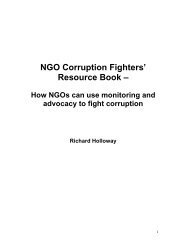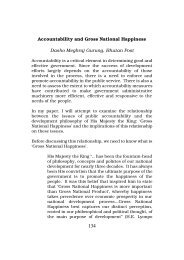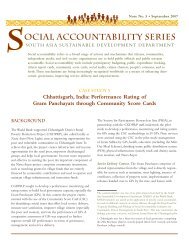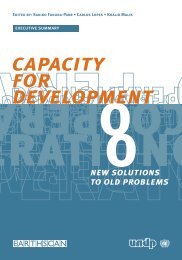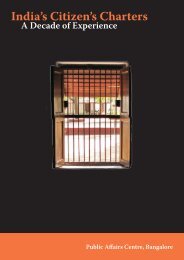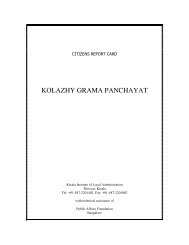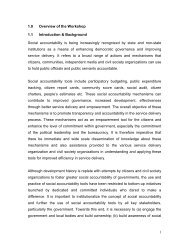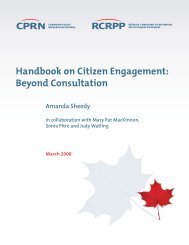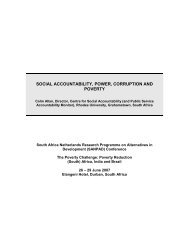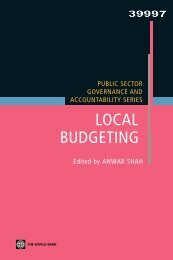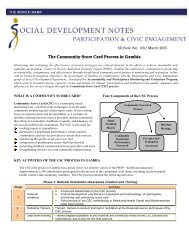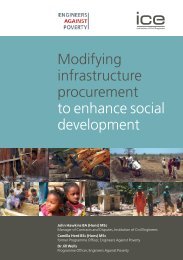Enabling Environment for Social Accountability in ... - SASANet
Enabling Environment for Social Accountability in ... - SASANet
Enabling Environment for Social Accountability in ... - SASANet
Create successful ePaper yourself
Turn your PDF publications into a flip-book with our unique Google optimized e-Paper software.
Although the <strong>Environment</strong>al Impact Assessment Law exists, environmental NGOs stress that there is lack<br />
of both capacity and consistency <strong>in</strong> en<strong>for</strong>c<strong>in</strong>g that law. Citizens there<strong>for</strong>e have few opportunities to give<br />
their views on natural resources projects prior to government approval. The Ongi River Movement case<br />
study (Annex 3) provides an illustration of m<strong>in</strong><strong>in</strong>g operations that were begun without prior EIAs.<br />
3.4.2 F<strong>in</strong>d<strong>in</strong>gs and Recommendations Relat<strong>in</strong>g to Negotiation<br />
As with the enabl<strong>in</strong>g elements of Voice and In<strong>for</strong>mation, <strong>for</strong>mal mechanisms <strong>for</strong> Negotiation with public<br />
officials have dramatically <strong>in</strong>creased s<strong>in</strong>ce the transition to democracy <strong>in</strong> the early 1990s. Nevertheless,<br />
citizens and CSOs alike seek <strong>in</strong><strong>for</strong>mal opportunities to negotiate with officials. However, <strong>in</strong><strong>for</strong>mal sett<strong>in</strong>g<br />
such as this one results <strong>in</strong> highly ad hoc basis <strong>for</strong> negotiation that favors CSOs with extensive social<br />
capital (networks) and greater proximity to officials (UB-based). Although some of the obstacles to<br />
negotiation may be mitigated through GoM, CSO, and donor actions, as outl<strong>in</strong>ed <strong>in</strong> the follow<strong>in</strong>g<br />
recommendations, the most critical challenge to Negotiation (as well as Voice and In<strong>for</strong>mation) is the<br />
lack of understand<strong>in</strong>g about the CSO role <strong>in</strong> promot<strong>in</strong>g civic engagement/social accountability among<br />
officials and the general public.<br />
F<strong>in</strong>d<strong>in</strong>g 3.4.1. While the Community Scorecard, as part of the World Bank-supported Susta<strong>in</strong>able<br />
Livelihoods Project, allows beneficiaries to assess the quality and effectiveness of SLP subprojects, it<br />
could be enhanced to provide more opportunities <strong>for</strong> Voice, In<strong>for</strong>mation, and Negotiation.<br />
Recommendation: Incorporate best practices from the portfolio of Bank-supported operations us<strong>in</strong>g<br />
CSCs <strong>in</strong>to the Susta<strong>in</strong>able Livelihoods Project so that citizens can monitor the quality of services and<br />
negotiate the necessary changes to improve the program. This ef<strong>for</strong>t may be supported, <strong>for</strong> example,<br />
through “South-South” learn<strong>in</strong>g and <strong>in</strong>-country capacity-build<strong>in</strong>g activities. The SLP should create<br />
partnerships with CSOs and develop their capacity to use community score cards effectively.<br />
F<strong>in</strong>d<strong>in</strong>g 3.4.2. Mongolia’s <strong>in</strong>tergovernmental arrangements, particularly the PSMFL, limit local<br />
government accountability to local constituents and constra<strong>in</strong> citizen participation <strong>in</strong> local governance.<br />
Recommendations:<br />
1) In consultation with CSOs, public officials should address the lack of downward accountability.<br />
They should consider legal and regulatory re<strong>for</strong>m and the creation of <strong>for</strong>ums or other<br />
mechanisms, as well as the need <strong>for</strong> leadership from senior public officials to change the current<br />
political culture of upward accountability.<br />
2) The M<strong>in</strong>istry of F<strong>in</strong>ance and Economics, <strong>in</strong> particular, should collaborate with CSOs to enhance<br />
citizen engagement <strong>in</strong> the budget process. There should be greater budget disclosure to local<br />
citizens, more <strong>for</strong>ums <strong>for</strong> civic <strong>in</strong>volvement <strong>in</strong> sett<strong>in</strong>g local development and budget priorities,<br />
track<strong>in</strong>g expenditures, and <strong>in</strong> evaluat<strong>in</strong>g per<strong>for</strong>mance. There must also be mechanisms <strong>for</strong><br />
transparency and direct accountability; governors, khurals, and citizens should also be responsible<br />
<strong>for</strong> the local components of l<strong>in</strong>e m<strong>in</strong>istry budgets (<strong>for</strong> example, schools and hospitals).<br />
3) S<strong>in</strong>ce local governors wield substantial power but lack downward accountability, the GoM,<br />
CSOs, and donors should evaluate the adverse economic and governance consequences of this<br />
structure of authority, and develop programs to <strong>in</strong>crease awareness of the important role that<br />
citizens and CSOs play <strong>in</strong> improv<strong>in</strong>g local governance, and how local governments can facilitate<br />
such a role. Such a program, which could benefit from <strong>in</strong>ternational best practices, may <strong>in</strong><strong>for</strong>m<br />
future proposals <strong>for</strong> improvement of political and fiscal decentralization <strong>in</strong> Mongolia.<br />
F<strong>in</strong>d<strong>in</strong>g 3.4.3. There are no <strong>for</strong>mal mechanisms through which CSOs can become <strong>in</strong>volved <strong>in</strong> the<br />
legislative process or policy <strong>for</strong>mulation.<br />
45



